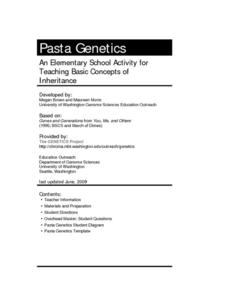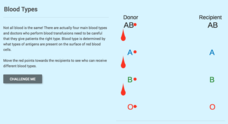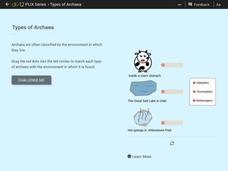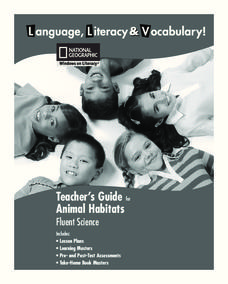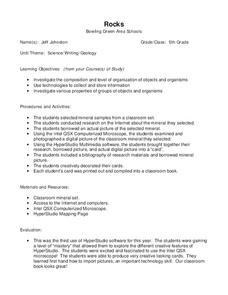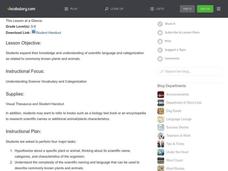American Chemical Society
From Gas to Liquid to Solid
From gas to liquid condensation to solid frost, water undergoes phase changes before young scholars' eyes! Using ice, salt, water, and a metal can, they set up an investigation that can be used in a physical science setting, or as part...
We are Teachers
NGSS Explained
Here is a very attractive and well-designed infographic explaining the Next Generation Science Standards (NGSS).
Whitman College
Virtual Fetal Pig Dissection
Pigs and humans have the same metabolism level and similar organs and systems, which is why they are often used in scientific laboratories. This worthy virtual dissection of a fetal pig divides into eight chapters: anatomical references,...
University of Washington
Pasta Genetics
Four different-shaped and dyed pasta types represent four different alleles. Following a guide sheet, young geneticists practice randomly selecting alleles and discover the traits of the resulting offspring. This is a fun and solid...
Science 4 Inquiry
Genetics, Genetics, and More Genetics: Exploring Independent Assortment and Non-Mendelian Genetics
Two individuals share 99.9 percent of their genetic codes, yet diversity is observed everywhere. Young scientists learn about diversity through hands-on activities and an experiment. They apply the concepts of independent assortment and...
Curated OER
Science Review Using Movie Maker
Students reinforce science concepts learned throughout the year using Movie Maker. Eighth grade students work with fourth grade students in which they create a movie project about a science topic after completing a graphic organizer.
CK-12 Foundation
Blood Types
Does your blood type matter? The video explains the four main blood types and the importance of knowing blood types when performing transfusions. The interactive reviews the information with a quick graphic organizer and questions.
CK-12 Foundation
Types of Archaea
One of the few organisms that are classified by the environment in which they live include archaea. The video describes the phylogeny of the group and their major characteristics. It details how they reproduce and discusses the diversity...
Curated OER
Ornithology and Real World Science
Double click that mouse because you just found an amazing lesson! This cross-curricular Ornithology lesson incorporates literature, writing, reading informational text, data collection, scientific inquiry, Internet research, art, and...
Curated OER
Body Organization and Organ Systems
Eighth graders begin the lesson by building a house of cards. They discuss ways that building a house of cards is similar to the way the body is built: different systems work together to help the whole body work together. Students listen...
Curated OER
Organisms and Their Environment
In this organisms and their environment instructional activity, students will review concepts relating to ecological studies, levels of organization in ecology, and relationships between organisms in ecosystems. This instructional...
Curated OER
Hydrocarbons
Making models is always memorable. In this activity, physical science starters examine the structure of hydrocarbons using marshmallows, raisins, and toothpicks. They even act as atoms themselves and link arms to represent covalent...
NOAA
Deep-Sea Ecosystems – Entering the Twilight Zone
Imagine an ecosystem without any light or oxygen, where living things convert carbon dioxide into food. This ecosystem is thriving and might just be the largest ecosystem on our planet, yet we know very little about it. The lesson plan...
Howard Hughes Medical Institute
Modeling Trophic Cascades
In the ecological game of who eats who, one small change can have a big impact! Individuals create food chains in an array of ecosystems, then determine what happens to organisms in the chain when one organism changes its feeding...
Curated OER
Fruit Fly Ranch Activity
Seventh graders describe how the traits of an organism are passed from generation to generation. They distinguish between asexual and sexul reproduction. Students identify traits through genes and those resulting from interactions with...
Royal Society of Chemistry
Some A-level Reagents
Learning names and formulas can be a daunting task for young chemists, so support their study with interactive puzzles! First, users match each formula with its correct name. Then, individuals use them to complete three logic games.
Curated OER
Carbon and The Molecular Diversity of Life
Biodiversity begins at the molecular level. When biology pupils complete this learning exercise, they will explore a variety of organic compounds that are necessary for life. Six short-answer questions and a chart of the functional...
NOAA
Where Have All the Glaciers Gone?
What happens when ice melts? Well ... water happens. When that melting ice is a glacier, the amount of water that results produces change throughout the world. Middle school science sleuths uncover the truth about global warming, the...
University of Southern California
What Lives In The Ocean?
One of the most diverse environments on Earth is the ocean. Young scientists explore the living things found in the ocean during an exciting seven-lesson unit. Their study includes organisms from plankton to invertebrates and vertebrates...
National Geographic
Animal Habitats
Explore animal habitats and reinforce speaking, listening, reading comprehension, and writing skills with a unit that focuses on the Arctic, desert, ocean, prairie, and rainforest. Enthusiastic scientists read informational text to...
Curated OER
Rocks
Fifth graders, while in the computer lab, investigate and study the composition and level of organization of objects and organisms and utilize technology to collect and store information collected. They explore, research and examine a...
It's About Time
Organizing a Store
When provided with multiple objects, how many ways can the class organize and display them based on predetermined factors? Assist class members with a handy activity—theoretically teaching them concepts to understand periodic table...
Curated OER
Understanding Science Vocabulary and Categorization
Students analyze scientific vocabulary words. In this life science vocabulary lesson, students complete a worksheet using VisualThesaurus as they evaluate words related to plants and animals and how the words are used.
Virginia Department of Education
Freshwater Food Chains
What's in the water? Encourage your class to further explore this question and learn about pond ecosystems, food chains, and food webs as they complete this hands-on activity. They view the environment from a new perspective after...





